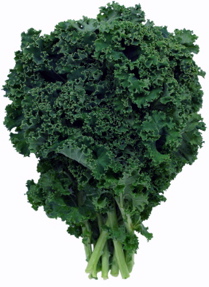Kale

Kale is a cruciferous vegetable, a family that includes Brussels sprouts, broccoli, and cauliflower. These vegetables are known for their powerful cancer-fighting properties.
Several varieties of kale are commonly sold in grocery stores. Curley kale, which can be green or purple, and dinosaur kale (also called lacinato kale) are the most widely available.
Store kale wrapped in a damp paper towel in a plastic bag in the refrigerator. Although it can last for several days, it will become more bitter over time.
See also Leafy Greens.
| Serving size: | 100 g (1-1/2 cups) |
Health Benefits
| Hydrochloric Acid | Stimulates production of hydrochloric acid in the stomach. |
Nutrients
| Calcium | 135 mg | 11% | |
| Iron | 1.7 mg | 11% | |
| Manganese | 0.8 mg | 27% | |
| Potassium | 447 mg | 13% | |
| Protein/Amino Acids | 3.3 g | 7% | A good source of all 9 essential amino acids in the proper ratios. |
| Sulfur | N/A | N/A | Best when eaten raw and juiced or well-blended. |
| Vitamin A | 15376 IU | 308% | Especially high in beta carotene. |
| Vitamin B6 | 0.3 mg | 17% | |
| Vitamin C | 120 mg | 200% | |
| Vitamin K | 817 mg | 1021% | |
| Zinc | 0.4 mg | 3% |
